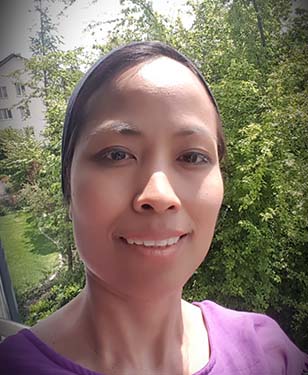Eight years ago, a doctor diagnosed Mayu with Multiple Sclerosis (MS), a progressive condition that affects the central nervous system. The symptoms include numbness of the limbs, trembling, and vision problems. It was the vision issues that prompted Mayu to see a doctor. "I had difficulty seeing letters in my left eye," she says. An ophthalmologist diagnosed Mayu with optic neuritis, but after she received an MRI in the pursuit of treatment, the test revealed she actually had MS.
Mayu said steroid pulse therapy helped with the symptoms in her eyes, and, in the beginning, there were no other symptoms, she notes. But as the disease progressed, she began experiencing trembling in her hands, making her fearful for the future. An avid piano player since childhood, Mayu started playing at the age of three and studied music in college. She continued to play after graduation, performing at restaurants, weddings and parties. But now she wondered if she would eventually lose the ability to play.
The challenges of motherhood
At the time of her diagnosis, Mayu was a new mother of a two-month-old baby, and the disease caused challenges. "I was still breastfeeding him, so it was hard for both my son and me." Mayu credits her husband for his love and support, as she navigated life as a new mother while dealing with her diagnosis and symptoms, which led to hospitalization.
Her son, now in third grade, has become an important support system as well. "It's difficult to be as energetic as other mothers," she says, noting that she hasn't discussed everything about MS with him. "He's still in elementary school, and I thought it would be too early to know the details of my illness, so I explain that I get tired easily and have headaches more often than others." But while he may not completely understand the disease, her son helps her tremendously. "He checks with me to see if I am too tired from walking,” Mayu says, adding “when we get on a bus, he gives me a hand up the step." As a mother, she is proud that he is so thoughtful at such a young age and is hopeful that these experiences will teach him "to be kind and understanding of people’s pain, as he gets older."
His maturity is especially remarkable because MS isn't always apparent to other people. "It's hard to see that you are suffering from the disease because the symptoms aren't obvious," Mayu explains. During relapses, which she calls "big waves attacking the body,” she requires a cane or a wheelchair. "People are kind and don't ask me directly but I'm in a wheelchair, even though I used to walk normally, and I think people wonder."






